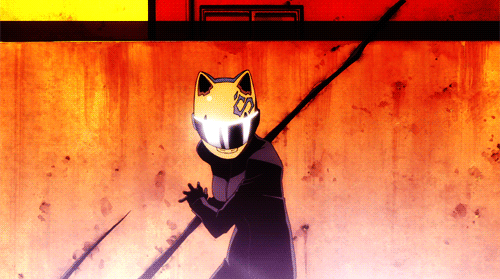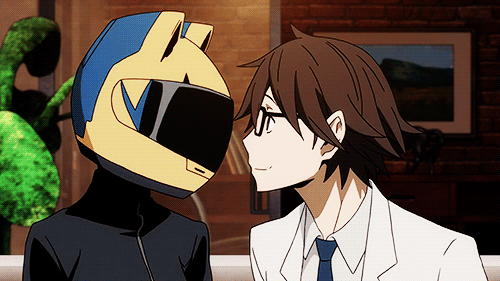So its the final day of National Novel Writing Month. At this point I'm sure many of you, like me, are scrambling to reach their 50,000 word count. But I'm taking a break in this moment to talk not only about succeeding at the NaNoWriMo challenge but failing it as well.
Today, some of you will hit your 50,000 words. Some of you already have and are going for an even larger word goal. And that's AMAZING. Maybe 80% of the words are crap. Maybe you don't even know if it works as a story. But you wrote a novel in a month. That's an astonishing feat of dedication. You worked hard and even if you don't come back to this novel in the near future, you earned some valuable writing experience.
For some of you, maybe this is the first novel you've ever finished. That's even more amazing, because now you know you can do it. With enough hard work and dedication, you can type 'the end' on a book. I hope you write many, many more.
For others this is their tenth novel. Which is also SO cool. You've put out so many books and even if they haven't all been winners, some of them are. Some of them have or will taken you all the way to down the publishing road.
If you won this year's NaNoWriMo, pat yourself on the back. Take a breath. Then put away your draft and take a well deserved break. You can edit out all the terrible parts later.
But some of you may have "lost" NaNoWriMo this year. But honestly, why think about it as a loss? Whatever you managed to write--10,000 words, 20,000 words, 30,000 etc--that's still a good chunk of a novel. You're still one step closer to a completed draft. Maybe you're close to 50,000 but you won't be able to hit it today. That's fine. Take your time. What does it matter if you finish a draft in a month and a day, a month and a week or even two months? That's still a tremendous accomplishment.
The bottom line is, NaNoWriMo isn't for everyone. Sometimes people draft slowly. That's a valid way to write a novel. As long as it gets done and you're proud of it, who cares that it wasn't written in a month? You're still a writer who wrote a whole book. Celebrate that.
I've won NaNoWriMo and I've lost NaNoWriMo. Sometimes, I burnt myself out writing in October before I hit November. Last year, my life was too emotionally tumultuous and I didn't write a dang thing in the Fall. I felt terrible about it because fast drafting is my skill. I felt so unproductive and like I lost my creative spark. But then I hit spring of 2016 and I fast drafted two novels. Those novels weren't better or worse because I didn't write them in November. They were still drafts. Messy drafts, but drafts none the less.
So if you tried NaNoWriMo at all this year, whether you won or "lost", pat yourself on the back and celebrate. Not many people would even attempt what you guys did and you deserve all the credit in the world for it. Tomorrrow's a new day of writing and who knows what it will bring!
A literary agent intern, writer and full time student treks through the forest of words
Wednesday, November 30, 2016
Friday, November 18, 2016
Lessons from Anime- Loving Parody in Ouran Highschool Hostclub and Assassination Classroom
Parody is a lot harder than you think.
It’s actually very hard to parody any movie, book, genre
etc. in a consistently clever and interesting way. Films like ‘epic movie’ and ‘Scary
Movie 1,000’ often beat the same jokes into the ground, throw in some gross
humor and call it smart satire.
Often, poorly written parody can invoke eye rolls,
especially if it doesn’t have a solid story of its own. If its just parody
without a well written plot and characters, then it’s a house built on sand.
One of the reasons I’m not that big a fan of the first Shrek movie is that at
the base of its parody of fairytales is a plot that is predictable and old as time. Which makes it kinda
boring.

But there’s another reason I’m not as big a fan of Shrek,
and that’s the point about parody I really want to emphasize today. There are
two types of parody. The most common, and often the easier to write, is hateful
parody. This satire is biting and vicious to its original source material. It hates
it. Many of the jokes are intensely mean spirited because of the deep seeded
hatred on the part of the authors. In the case of Shrek? Well maybe Dreamworks
wanted to crush Disney down to size after Jeffery Katzenberg broke ties with
them. Maybe. Shrek 2 actually
improves upon the first by being less intensely
bitter.
But while hateful parody would seem the most likely, there
is another form of parody that is just much
harder to pull off. And that is the loving parody. Loving parody truly
adores the genre or movie it is parodying. But that doesn’t keep it from making
fun of its target at every turn. And at the end of the day, rather than trying
to take the subject down a peg, they’re celebrating it for its tropes and its
good qualities.

Ouran High school Host Club is one such satire of reverse
harem and shojo manga, about a poor honor student who accidentally breaks an
expensive vase and falls in debt to her school host club. Thinking she’s a guy
because of her appearance, the host club promises to forgive her debt if she
becomes a host herself and gets one hundred girls to ask for her. And of course half the guys end up falling for her, though especially Tamaki.

The main male love interest, Tamaki is obsessed with the
role of being the main love interest but is cripplingly insecure about it. The
rest of the guys are also embodiments of various tropes, but they manage to
break out of them at various points for both comedy and drama. And the lead,
Haruhi, has no interest in the guy’s vying for her attention and is the most
down to earth of everyone.
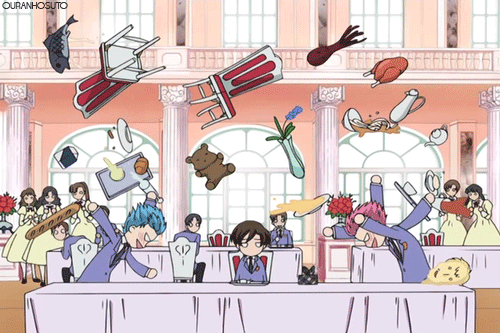
This show has a great understanding of its trope but it’s
not trying to break its characters down. It loves them. And at the heart of the
anime is a lot of emotional sincerity. Melodramatic? Oh god yes, but that’s the fun of it. Its melodrama with enough fourth
wall jokes and loving pokes to make it quality parody.

Then there’s Assassination Classroom which is a stellar
parody of the ‘Teacher goes to a dead end class and inspires them to believe in
themselves and go for their dreams’ narrative. Except for in this case, the
teacher is a mutant balloon looking creature that blew up the moon and is going
to blow up the earth in a year. And in between inspirational lessons, the
students are trying to kill their teacher, honing their skills as assassins and
trying to raise their grades.

And it’s just…its hilarious. The situation is treated rather
casually and despite being constantly under fire, the teacher never stops
believing in his students. At every episode he helps at least one of them step
out of their shell and realize their strengths. It’s amusing to hear the lesson
coming from a yellow, tentacle balloon monster, but also oddly emotionally heartwarming.
The show isn’t condemning the subject of its parody. Its embracing it but
flooding it with humor at the same time. And the show concludes with one of the
most cry worthy scenes I’ve seen in any show.

Loving parody is just as funny as hateful parody (in my
opinion more so) but it also manages to remain sincere. Because it cares about
its characters, we care about them too when they’re in trouble. We don’t laugh
at their pain we feel it with them.
And then we laugh at them in the very next scene. It’s certainly a harder
method to pull off, but it’s worth it and ultimately so much more rewarding.
Wednesday, November 16, 2016
Notes from New York: The Importance of Comparative Titles
Welcome back to Notes from New York. Today we talk about a querying tip rather than a writing tip: specifically ‘comparative titles’, or as I always heard them referred to ‘comps’.
Comps are something that a lot of people write in their queries. In many ways, it’s a good idea. If you can compare your book to a certain title, that gives the agent some idea of what to expect and also how they might market your book in the future. If you do get an agent, part of submitting to editors is making a list of comparative titles to show where your book stands in the industry.
However, while comps can be a good thing in a query times they can work against you. So here’s a list of dos and don’ts with comps.
1. Don’t aim to high
Your book is not the next Harry Potter. Even if it somehow, spectacularly, is the next Harry Potter, you have no way of knowing that at the time of querying. Some people comp really well known, best selling titles because they think it shows their books money making potential. Really, all it does is show you don’t know the industry or you way overestimate the selling power of your work. Most books don’t sell like Harry Potter. In fact, just about all books don’t sell like Harry Potter. So don’t aim too high.
2. Do aim at the middle
It never hurts to comp a relatively well known, but not unbelievably popular title. There are a lot more of these, and chances are, it will be easier for you to find an accurate comp to your work in this category. This will better show that you know where your book stands within its genre
3. Don’t comp books your agent already represents
Mostly because, the agent already has a similar book for their list and might be less interested. An agent will love the authors that they have taken on, which means that you’re fighting an uphill battle when you claim they will love your book just as much. Additionally, they might not have room for more similar titles on their list.
4. Do comp an agents favorite books
Most agents have blogs or websites or twitters where they talk about their favorite books and TV shows. They write about these things so that people will know what to send their way. You still may be fighting an uphill battle because they have high expectations, but if they are looking for something in the vein of their favorite work, comping said work can be a way to get you noticed. Just be sure its accurate and back it up with great writing.
5. Don’t feel the need to include comps
Comparative works in the query really aren’t necessary. If you don’t have good ones or you’re not sure what to compare your book to, leave them out. The most important part of the query is the part about your book. If your query is good, you don’t need to add comp titles if you’re not sure what you’d put
6. Do still be aware of comparative titles
When you are querying you should none the less be aware of your genre, category and marketability. This will help you enormously in the querying and publishing process. Read a lot in your genre to find some comparative titles. Even if you don’t put them in your query, they will help you down the line.
Good luck querying and I hope everyone has hit the midpoint of NaNoWriMo :)
Comps are something that a lot of people write in their queries. In many ways, it’s a good idea. If you can compare your book to a certain title, that gives the agent some idea of what to expect and also how they might market your book in the future. If you do get an agent, part of submitting to editors is making a list of comparative titles to show where your book stands in the industry.
However, while comps can be a good thing in a query times they can work against you. So here’s a list of dos and don’ts with comps.
1. Don’t aim to high
Your book is not the next Harry Potter. Even if it somehow, spectacularly, is the next Harry Potter, you have no way of knowing that at the time of querying. Some people comp really well known, best selling titles because they think it shows their books money making potential. Really, all it does is show you don’t know the industry or you way overestimate the selling power of your work. Most books don’t sell like Harry Potter. In fact, just about all books don’t sell like Harry Potter. So don’t aim too high.
2. Do aim at the middle
It never hurts to comp a relatively well known, but not unbelievably popular title. There are a lot more of these, and chances are, it will be easier for you to find an accurate comp to your work in this category. This will better show that you know where your book stands within its genre
3. Don’t comp books your agent already represents
Mostly because, the agent already has a similar book for their list and might be less interested. An agent will love the authors that they have taken on, which means that you’re fighting an uphill battle when you claim they will love your book just as much. Additionally, they might not have room for more similar titles on their list.
4. Do comp an agents favorite books
Most agents have blogs or websites or twitters where they talk about their favorite books and TV shows. They write about these things so that people will know what to send their way. You still may be fighting an uphill battle because they have high expectations, but if they are looking for something in the vein of their favorite work, comping said work can be a way to get you noticed. Just be sure its accurate and back it up with great writing.
5. Don’t feel the need to include comps
Comparative works in the query really aren’t necessary. If you don’t have good ones or you’re not sure what to compare your book to, leave them out. The most important part of the query is the part about your book. If your query is good, you don’t need to add comp titles if you’re not sure what you’d put
6. Do still be aware of comparative titles
When you are querying you should none the less be aware of your genre, category and marketability. This will help you enormously in the querying and publishing process. Read a lot in your genre to find some comparative titles. Even if you don’t put them in your query, they will help you down the line.
Good luck querying and I hope everyone has hit the midpoint of NaNoWriMo :)
Wednesday, November 9, 2016
Post Election Blog Post
Not doing a normal blog post today, mostly cause I'm not feeling it. Last night, as I watched my computer screen in horror, it took awhile for it to set in. I cried on my floor last night as I realized I was pretty freaking scared, for myself and for other people. I know a lot of you feel the same.
I don't get political in a lot of spheres because I don't like to engage in political debates. And this isn't going to be a ranting post about how much I hate Trump (though I truly do). We've talked about it. We've debated. Now the decision is final and the difficult thing now becomes fighting through these next four years.
I grew up around immigrants and PoCs. I lived right next to the most diverse zipcode in the nation. In my classes I was surrounded by first and second generation American citizens from India, South Korea, China, the Middle East etc. Those people taught me so much about different belief systems and other cultures and other religions. Now I'm sure some of those people are afraid of being deported. To them and to people in thier position, you are wonderful, and loved and your culture is important. You are an American and you deserve this country.
I grew up around women who survived sexual abuse. My mom was working with women who faced assalt from when they were children to adulthood. When I was a kid I didn't understand what any of that meant, but when I was adult, I realized that in some twisted way I was lucky not to be a survivor myself. And many of those who have experienced sexual abuse, harrassment and assalt are horrified right now that we could elect a man who admitted to sexually harrassing women. To those people, you are strong. You are so infinitely strong. Keep fighting. We need women like you.
When I started college I was surrounded by a prominent LGBTQ community. One of the first people I met on campus was transgendered. I had never known a transgendered person before. He taught me what I never understood about gender vs sexuality. My classmates are still fighting for their rights everyday and they're afraid to see Trump elected with a vice president who supports conversion therapy at his back. For those people, you matter. You are valid. Don't let anyone tell you that you are lesser because of who you love or how you feel. And please keep making your voices heard.
There are people who are afraid right now. There are people who are terrified. And even though it seems that 50% of America just said that some of its precious citizens don't matter, you do. You matter so much. The diversity of our country is so crucial to its identity. Without your voices, this wouldn't be America.
And to writers, because I know that's you guys are. Today, we are numb. But tomorrow, we keep writing. We keep writing diverse stories. Empathetic stories. We do what we can. Books can change minds in a fundemental way. So fight. Write. Make your voice heard. I love you all.
I don't get political in a lot of spheres because I don't like to engage in political debates. And this isn't going to be a ranting post about how much I hate Trump (though I truly do). We've talked about it. We've debated. Now the decision is final and the difficult thing now becomes fighting through these next four years.
I grew up around immigrants and PoCs. I lived right next to the most diverse zipcode in the nation. In my classes I was surrounded by first and second generation American citizens from India, South Korea, China, the Middle East etc. Those people taught me so much about different belief systems and other cultures and other religions. Now I'm sure some of those people are afraid of being deported. To them and to people in thier position, you are wonderful, and loved and your culture is important. You are an American and you deserve this country.
I grew up around women who survived sexual abuse. My mom was working with women who faced assalt from when they were children to adulthood. When I was a kid I didn't understand what any of that meant, but when I was adult, I realized that in some twisted way I was lucky not to be a survivor myself. And many of those who have experienced sexual abuse, harrassment and assalt are horrified right now that we could elect a man who admitted to sexually harrassing women. To those people, you are strong. You are so infinitely strong. Keep fighting. We need women like you.
When I started college I was surrounded by a prominent LGBTQ community. One of the first people I met on campus was transgendered. I had never known a transgendered person before. He taught me what I never understood about gender vs sexuality. My classmates are still fighting for their rights everyday and they're afraid to see Trump elected with a vice president who supports conversion therapy at his back. For those people, you matter. You are valid. Don't let anyone tell you that you are lesser because of who you love or how you feel. And please keep making your voices heard.
There are people who are afraid right now. There are people who are terrified. And even though it seems that 50% of America just said that some of its precious citizens don't matter, you do. You matter so much. The diversity of our country is so crucial to its identity. Without your voices, this wouldn't be America.
And to writers, because I know that's you guys are. Today, we are numb. But tomorrow, we keep writing. We keep writing diverse stories. Empathetic stories. We do what we can. Books can change minds in a fundemental way. So fight. Write. Make your voice heard. I love you all.
Friday, November 4, 2016
Lessons from Anime- Monster and the Slow Thriller
Welcome back to Lessons from Anime!
Taking a break from talking about anything Durarara (my god)
I want to give a spotlight to a particular favorite show of mine today. It’s
not in my top 10 animes, but it is truly a master work and I’ve written posts
about it before: Monster.

This is magnum opus of a thriller, with a wide spread of
interesting characters, intrigue, and my favorite villain of all time in
anything ever. But I want to talk more about the first aspect today,
particularly, the lost art of the slow thriller.
I think we have an idea of thrillers these days that they
have to be fast paced. You should be able to rip through them in a day and by
the end, be left with your heart pounding. And while there is something to be
said for the intense but short thriller, there is also something to be said for
a different, but much more difficult route.
The slow thriller, is by no means boring. No, it’s just not littered with gun fights and action set
pieces. It relies often on the intricacies of the human mind. Slow thrillers
are psychological. While a fast thriller might make your heart race with
anticipation, a slow thriller makes your heart race because you’re waiting for
the other shoe to drop. You know something is going to happen, but you have no
idea when and it puts you on edge.
While re-watching Monster, I was struck how well constructed
it is as a thriller. It constantly makes you nervous. Constantly. Something
idyllic? Nervous. Something quiet? Nervous. A pleasant, nice character is
introduced? Nervous. It’s not that things always go wrong either. Sometimes
everything turns out great and nice characters live. But you never know. Just about every episode I watched
with my roommate, she said the phrase, ‘I don’t trust this’. Which is a pretty
good sign that the thriller was doing its job.
So what does Monster do so well that makes it such a
stellar, psychological thriller?
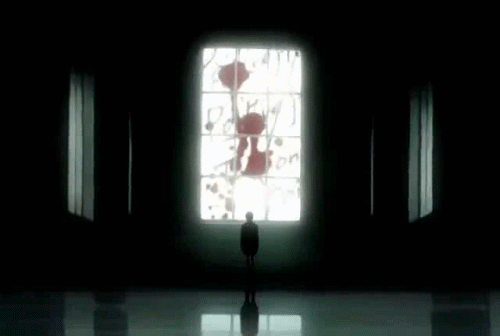
Well, it all connects back to the handling of its villain.
It takes the first four episodes to build this guy up before revealing him in
one of the most intense scenes I’ve ever watched. And then he disappears. His
presence doesn’t disappear, but he does not arrive on screen for the next twenty episodes. Instead we just see the
results of his work. We see his hand in several dangerous organizations. We
meet a group of Neo-Nazis who want to make them their leader, and then stumble
across their bodies as the villain has killed them all and written frightening
messages on the wall.
When he finally does show up, he does so very casually at
the end of an episode that seemed like another fake out for his reveal. And
then--boom--he just walks up two characters and engages in casual conversation
with them. It’s a great sort of bait and switch.
When we’re not paranoid about the villain, we’re paranoid
for the hero who is accused of murder. Every nice person he meets, we wonder if
they will ultimately turn him in. The show puts us into his head, giving us a
great view of his fear and distrust, contrasting it with his desire to help
people even if they turn them in.
Most importantly, the show holds the answers back. The show
is dedicated to finding out what made the villain the monster that he is. At
first, it seems that his evil was born in a brutal orphanage. But we find out
he was screwed up before that. It’s possible that he has an alternate
personality because of messages he writes, but then it turns out he’s just
quoting a picture book. At some point you’re watching the show just because you want to figure this guy out.
And his ultimate fall off the wagon into the depths of depravity is something
so oddly simple, which I won’t spoil here. The show isn’t interested in doling
out answers immediately. They give them little by little to keep its watchers
chomping at the bit the whole way through.

If you’re looking for a good example of a slow burn,
psychological thriller, this is the show to watch. It will keep you on the edge
of your seat, make you nervous, but also be one heck of a ride.
Wednesday, November 2, 2016
Notes from New York: Unlikable Protagonists
We’ve been focusing on larger elements like plot and setting over the past few weeks, but what about character? Obviously your characters are the human connection through which readers access the story and if they’re flat or poorly written, the whole novel comes tumbling down.
Today I want to focus on a particularly difficult type of protagonist to pull off: the unlikable kind
The big issue with the unlikable protagonist is they are, of course, unlikable. While all protagonists have flaws (all good ones anyways) most are defined primarily by their virtues. The unlikable protagonist, on the other hand, is more defined by their faults. Shakespeare is full of unlikable protagonists where their faults reign supreme. Macbeth, Hamlet and Corlianus to name a few. In more modern works, we have our fair share of anti-heroes who, while not strictly written as good, ultimately win our hearts in the end with their character arcs. I’ve done a post about the anti-hero here.
But there are two major pitfalls that your unlikable protagonist can fall into that will drag your manuscript from great to irredeemably frustrating.
1. Their Flaws do not Meet with Consequences
Flaws are meaningless if they never cost your character anything. They become little better than quirks with no plot significance. In tragedies, the climactic moment is often built on the character’s flaws. Macbeth is blinded by power, Corlianus is murdered by his own ideals, and Hamlet is just a drama queen who really could have avoided so many people dying if he had just stopped monologue about fate. We accept these flaws because they face the consequences.

Now it doesn’t have to be so serious as death but even some acknowledgment is needed. Other character point out Scar’s hypocrisy in Fullmetal Alchemist and he eventually shifts his views. Jaime Lannister suffers heavy losses when he relies too heavily on his family name. And he also changes in time because he must deal with these losses.
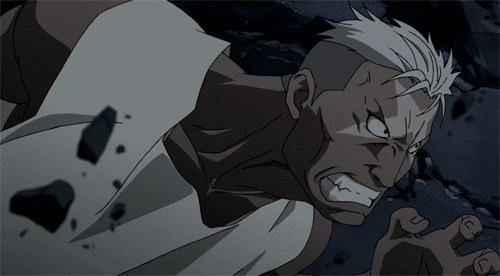
When a character never faces consequences for their mistakes, their flaws feel pointless. Why not just make them perfect then? That was one of my principal problems with Throne of Glass. The main character is told that if she shows off, she’ll stick out and that could cause problems for her. She then shows off--and really there are no consequences. It made her incredibly frustrating for me.
2. There is no arc
Characters should have an arc. Even if it’s a small one. Unless the plot hinges on your protagonist being flat…they need an arc. Thus, if your main character is an anti-hero, they probably should undergo a transformation where they become slightly less of an asshole. They don’t need to see the light, necessarily, but there should be some shift in their world view. Conversely, if they don’t’ develop, their flaws should drive them to a gruesome end. I’m not saying their aren’t exceptions to this rule, but a protagonist who shows up flawed and makes it out, still flawed, and unchanged, is boring.
3. You didn’t actually intend for them to be unlikable
Sometimes a writer isn’t trying to write an unlikable character. Sometimes they might think their character is entirely relatable. I read more than one manuscript when a character was relatively nasty, but they really had no arc over the book, nor did any characters around them seem to view them as flawed in any way. And this is really the worst thing you can do to a protagonist. If a writer misunderstands their character, the rest of the novel will probably sink. The only way to see if perhaps your character isn’t as perfect as you think they are is to get second opinions. From those second opinions you can tell how to reevaluate and maybe change up your protagonist’s arc.
You can pull off a well written unlikable protagonist, and they can have deeply interesting stories. But tread lightly and make sure that they’re engaging, intentionally flawed, and have a solid arc, whether it end in redemption or tragedy.
Today I want to focus on a particularly difficult type of protagonist to pull off: the unlikable kind
The big issue with the unlikable protagonist is they are, of course, unlikable. While all protagonists have flaws (all good ones anyways) most are defined primarily by their virtues. The unlikable protagonist, on the other hand, is more defined by their faults. Shakespeare is full of unlikable protagonists where their faults reign supreme. Macbeth, Hamlet and Corlianus to name a few. In more modern works, we have our fair share of anti-heroes who, while not strictly written as good, ultimately win our hearts in the end with their character arcs. I’ve done a post about the anti-hero here.
But there are two major pitfalls that your unlikable protagonist can fall into that will drag your manuscript from great to irredeemably frustrating.
1. Their Flaws do not Meet with Consequences
Flaws are meaningless if they never cost your character anything. They become little better than quirks with no plot significance. In tragedies, the climactic moment is often built on the character’s flaws. Macbeth is blinded by power, Corlianus is murdered by his own ideals, and Hamlet is just a drama queen who really could have avoided so many people dying if he had just stopped monologue about fate. We accept these flaws because they face the consequences.

Now it doesn’t have to be so serious as death but even some acknowledgment is needed. Other character point out Scar’s hypocrisy in Fullmetal Alchemist and he eventually shifts his views. Jaime Lannister suffers heavy losses when he relies too heavily on his family name. And he also changes in time because he must deal with these losses.

When a character never faces consequences for their mistakes, their flaws feel pointless. Why not just make them perfect then? That was one of my principal problems with Throne of Glass. The main character is told that if she shows off, she’ll stick out and that could cause problems for her. She then shows off--and really there are no consequences. It made her incredibly frustrating for me.
2. There is no arc
Characters should have an arc. Even if it’s a small one. Unless the plot hinges on your protagonist being flat…they need an arc. Thus, if your main character is an anti-hero, they probably should undergo a transformation where they become slightly less of an asshole. They don’t need to see the light, necessarily, but there should be some shift in their world view. Conversely, if they don’t’ develop, their flaws should drive them to a gruesome end. I’m not saying their aren’t exceptions to this rule, but a protagonist who shows up flawed and makes it out, still flawed, and unchanged, is boring.
3. You didn’t actually intend for them to be unlikable
Sometimes a writer isn’t trying to write an unlikable character. Sometimes they might think their character is entirely relatable. I read more than one manuscript when a character was relatively nasty, but they really had no arc over the book, nor did any characters around them seem to view them as flawed in any way. And this is really the worst thing you can do to a protagonist. If a writer misunderstands their character, the rest of the novel will probably sink. The only way to see if perhaps your character isn’t as perfect as you think they are is to get second opinions. From those second opinions you can tell how to reevaluate and maybe change up your protagonist’s arc.
You can pull off a well written unlikable protagonist, and they can have deeply interesting stories. But tread lightly and make sure that they’re engaging, intentionally flawed, and have a solid arc, whether it end in redemption or tragedy.
Friday, October 28, 2016
Writing Sprints!
No 'Lessons from Anime' today because its taking me much longer to write that anime nihilists post than I thought. And I've been writing other stuff lately. Namely 19,000 words of the fourth book in the HOUR OF MISCHIEF series in the last three days. And since NaNoWriMo is coming up, I figured this would be relevant.
I basically write via sprints. I'm not a slow and careful drafter. I attack the draft with all of my terrible first sentences and messy plot mistakes and useless dialogue and I just let it fly. Better to get everything down and edit it later than risk losing interest in the story. But writing sprints can be hard for some people, especially writers with perfectionist tendencies who like to edit as they go. If that method works for you, that's fine, but if you find yourself never finishing anything because you keep getting bogged down in the details, maybe its time to switch it up.
Writing sprints involve writing and absolutely no editing. They can help you finish a draft, even if its in an extremely rough form. But drafts are never final and it doesn't matter how many times you have to edit it. You can edit the book when its complete. You can't edit words that aren't there.
So here are some tips for NaNoWriMo and writing sprints and general!
1. Don't read. At all.
I know you might want to go back and read your work. Don't. Unless you forget if you mentioned an important plot detail earlier or not, don't. If you go back and read, you'll feel the urge to edit and you'll break your pace. If the last section you wrote is crap, you can edit it later.
2. Don't get bogged down in difficult sections
Having trouble with a scene? Let yourself breeze past it in a paragraph and keep going to more interesting stuff. You can even skip over the scene and go back to write it later. One of the hardest thing in writing sprints are transitions between scenes. Don't stress over them. Just go.
3. Outline
Not everyone is an outliner, but I always sprint best when I know where the plot is going. That way I can set goals and I've already envisioned scenes in my mind before I write them. When I finally sit down to type it out, it flows much easier.
4. Bribe yourself
If you're settling down for a big writing sprint, bribe yourself with rewards. I once bought a bag of starburst jelly beans and ate one for every 100 words I wrote. This makes the process of writing fun and tasty. And if you're good at writing sprints, kind of bad for you.
5. Don't Give up
If you get behind during NaNoWriMo, don't be disheartened. There's plenty of time to catch up. You might have a day you just can't write, but maybe you'll write 3,000 words easily the next day. Its a whole month. Don't beat yourself up about it, even if you ultimately fail. Writing sprints are a difficult thing to learn, and ultimately, as long as you get to the end of the draft, its still a win.
And that's just five tips to make NaNoWriMo easier for you! Get out there and write :)
I basically write via sprints. I'm not a slow and careful drafter. I attack the draft with all of my terrible first sentences and messy plot mistakes and useless dialogue and I just let it fly. Better to get everything down and edit it later than risk losing interest in the story. But writing sprints can be hard for some people, especially writers with perfectionist tendencies who like to edit as they go. If that method works for you, that's fine, but if you find yourself never finishing anything because you keep getting bogged down in the details, maybe its time to switch it up.
Writing sprints involve writing and absolutely no editing. They can help you finish a draft, even if its in an extremely rough form. But drafts are never final and it doesn't matter how many times you have to edit it. You can edit the book when its complete. You can't edit words that aren't there.
So here are some tips for NaNoWriMo and writing sprints and general!
1. Don't read. At all.
I know you might want to go back and read your work. Don't. Unless you forget if you mentioned an important plot detail earlier or not, don't. If you go back and read, you'll feel the urge to edit and you'll break your pace. If the last section you wrote is crap, you can edit it later.
2. Don't get bogged down in difficult sections
Having trouble with a scene? Let yourself breeze past it in a paragraph and keep going to more interesting stuff. You can even skip over the scene and go back to write it later. One of the hardest thing in writing sprints are transitions between scenes. Don't stress over them. Just go.
3. Outline
Not everyone is an outliner, but I always sprint best when I know where the plot is going. That way I can set goals and I've already envisioned scenes in my mind before I write them. When I finally sit down to type it out, it flows much easier.
4. Bribe yourself
If you're settling down for a big writing sprint, bribe yourself with rewards. I once bought a bag of starburst jelly beans and ate one for every 100 words I wrote. This makes the process of writing fun and tasty. And if you're good at writing sprints, kind of bad for you.
5. Don't Give up
If you get behind during NaNoWriMo, don't be disheartened. There's plenty of time to catch up. You might have a day you just can't write, but maybe you'll write 3,000 words easily the next day. Its a whole month. Don't beat yourself up about it, even if you ultimately fail. Writing sprints are a difficult thing to learn, and ultimately, as long as you get to the end of the draft, its still a win.
And that's just five tips to make NaNoWriMo easier for you! Get out there and write :)
Wednesday, October 26, 2016
Notes from New York: Meshing Fantasy with Reality
Welcome back to Notes from New York. Last week we talked about world building, but this week we are going to dive into a more specific kind of world building: meshing fantasy with reality.
Contemporary fantasy, urban fantasy, magical realism and a host of other genres involve placing magical elements into our normal, everyday world. It can be a great way to view modern day issues through a different lens or just spice up the mundane. It’s an extremely popular method of world building and most comic books make use of this trope with great success, in addition to a swath of movies, TV shows and, of course, novels.
However, just because your book takes place in the modern world doesn’t mean the world building is any easier. In fact often times, meshing fantasy with reality can be difficult. So here’s some problems I’ve noticed in these genres and how to fix them.
1. Not fully integrated
Sometimes it seems like the author tossed in a fantastical element without really thinking about how it would affect the world. Like sure, a vampire society sounds cool, but how the heck hasn’t anyone gotten suspicious, considering all of the people drained of blood? If there are magicians that cause such disturbances, why is everyone so aggressively dumb to the magic going on around them? A lot of books come up with various ways to explain this. Memory charms, hallucinations etc. But if you don’t acknowledge how your magic society deals with the outside world, then it becomes a plot hole. Conversely, if the magic elements are fully integrated and everyone knows about them, how has that changed and shaped society? If it hasn’t had some significant effect, then your world won’t seem very well thought out.
2. Skimping on the setting
Just because you’re not making up the world doesn’t mean you shouldn’t give as much detail to the setting of your novel. Your job is still to root your reader in the story and maybe they haven’t been to the city where your book takes place. Make sure you still do your research and know what you’re talking about or the world will seem quite inauthentic.
3. They Just Don’t Mesh
Sometimes fantasy elements can seem downright random. I read a manuscript in which a fairytale like buddy comedy was mixed with a real life abusive relationship and it just did not pair at all. The fantastical elements felt so random and poorly integrated that sometimes I thought I was reading two different books. Make sure your fantastical and realistic aspects are all wholly necessary to the story you are trying to tell and take time to seamlessly fit them together.
In some ways, I think contemporary fantasy is even harder than inventing a world from scratch, because you do have to play by certain rules. However, so long as you focus just as much on the world building, your manuscript is sure to draw in readers.
Contemporary fantasy, urban fantasy, magical realism and a host of other genres involve placing magical elements into our normal, everyday world. It can be a great way to view modern day issues through a different lens or just spice up the mundane. It’s an extremely popular method of world building and most comic books make use of this trope with great success, in addition to a swath of movies, TV shows and, of course, novels.
However, just because your book takes place in the modern world doesn’t mean the world building is any easier. In fact often times, meshing fantasy with reality can be difficult. So here’s some problems I’ve noticed in these genres and how to fix them.
1. Not fully integrated
Sometimes it seems like the author tossed in a fantastical element without really thinking about how it would affect the world. Like sure, a vampire society sounds cool, but how the heck hasn’t anyone gotten suspicious, considering all of the people drained of blood? If there are magicians that cause such disturbances, why is everyone so aggressively dumb to the magic going on around them? A lot of books come up with various ways to explain this. Memory charms, hallucinations etc. But if you don’t acknowledge how your magic society deals with the outside world, then it becomes a plot hole. Conversely, if the magic elements are fully integrated and everyone knows about them, how has that changed and shaped society? If it hasn’t had some significant effect, then your world won’t seem very well thought out.
2. Skimping on the setting
Just because you’re not making up the world doesn’t mean you shouldn’t give as much detail to the setting of your novel. Your job is still to root your reader in the story and maybe they haven’t been to the city where your book takes place. Make sure you still do your research and know what you’re talking about or the world will seem quite inauthentic.
3. They Just Don’t Mesh
Sometimes fantasy elements can seem downright random. I read a manuscript in which a fairytale like buddy comedy was mixed with a real life abusive relationship and it just did not pair at all. The fantastical elements felt so random and poorly integrated that sometimes I thought I was reading two different books. Make sure your fantastical and realistic aspects are all wholly necessary to the story you are trying to tell and take time to seamlessly fit them together.
In some ways, I think contemporary fantasy is even harder than inventing a world from scratch, because you do have to play by certain rules. However, so long as you focus just as much on the world building, your manuscript is sure to draw in readers.
Friday, October 21, 2016
Lessons from Anime- Ensemble Casts in Angel Beats, Durarara and Assassination Classroom
Welcome back to Lessons from Anime! This week, we’re looking
at another group of shows that all share one key element: ensemble casts.
There are lots of different ways to tell a story. For
instance, you can take the Harry Potter route and root the narrative firmly in
the perspective of one character. But, on another hand, you can write a story
that is about a group of people, like in Mistborn, or even hundreds of people,
like in Game of Thrones. When you have several main characters and just as many
stories, it can be a tremendous balancing act. If you’re not careful, the
scales will tip and you’ll give way too much focus to a few characters while
letting others become practically nonexistent and unnecessary. Today we’re going to look at three anime that sport ensemble
casts to varying degrees of success.

First off, there’s Angel Beats, a well-known tear jerker and
a show that sports quite the large cast in its group picture at the closing
song. This show relies on a wide range of characters. Even though it
has its main characters, it clearly wants you to focus on the group as a unit,
especially when the show takes its more feelsy turns later on. Does it succeed?

Not…really. Outside of a group of about five characters,
none of the other cast get any noticeable screen time. They are reduced to
typical anime caricatures, good for a laugh but not as their own people. They are
sometimes indistinguishable from each other. The show just didn’t have balance
in its writing and at only thirteen episodes, it really didn’t have time to
keep such a large cast afloat. If you’re going to have a lot of characters,
make sure they actually need to be
there for more than a one off joke.

Then there’s Durarara, which yeah, I know, this is the third
time in a row I’ve brought it up, but its relevant. Durarara also supports a
large cast with a few clear leads in the mix. However, each of its characters
are involved in different stories that collide at different points. The
characters aren’t a collective unit. They’re a series of moving pieces that
pass each other in the street. This is more the Game of Thrones approach of
having several different storylines that eventually converge.

But while Durarara does a decent job with its cast of
thousands, it still lets a few plots go by the wayside, including some twin
sisters that are good for a laugh but have absolutely nothing to do with any of the plot. There are plenty of one off
characters that felt like they needed more screen time. But, to be
honest, I’m surprised Durarara managed its juggling act as well as it did. It
goes to show that when you give yourself several plot threads, make sure
they’re well integrated and they all reach some sort of resolution. That way
they won’t fall off the map and leave your readers wondering why they were
there in the first place.

The last show I want to talk about is perhaps the most
effective of the bunch, called
Assassination Classroom. Like Angel Beats, this is about a group as a unit,
focusing on a classroom of twenty eight students and their teacher (a mutant
who is going to blow up the world in a year). It has a main character lending
his narration to the events, but the show is conserned with all of the
characters. And I mean all of them.

Of the twenty eight students about half get a significant
part of an episode dedicated to them and every single one of them has a
starring moment. And none of the kids are anime caricatures. They’re real,
relatable kids. They’ve all been put in the dead end class for failures for
various reasons. Some of them are lazy geniuses, others struggle with
academics, some face pressures at home. But they all have their own interests
and passions that their teacher ultimately uses to their advantage. Many
characters don’t get much of a spotlight, but they work as they are supposed
to: as part of a unit. And by the end, they really do feel like a family.
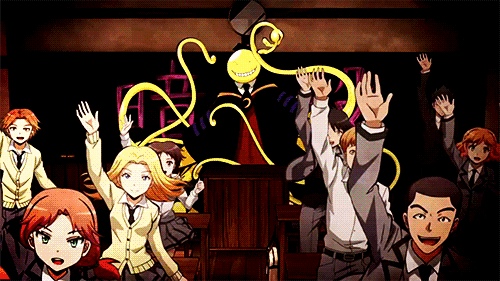
Assassination classroom has 48 episodes to work with of
course, plenty of time to give its characters their rightful places. But it
uses those 48 episodes exceedingly well, and I don’t remember the last time
I’ve seen anything handle such a large cast so expertly, especially when
they’re all in the same area for most of the show, following the same plot thread.
 |
| Its also hilarious |
As you can see, there are many ways to handle large casts,
with multiple plotlines or just one. Your mileage may vary, but make sure you
know your characters and just how much time they deserve in the spotlight.
Balance is the key and we want to love your characters as much as you do!
Labels:
anime,
character,
character arc,
characters,
comedy,
contemporary,
Durarara,
Fantasy,
lessons from anime,
plot,
urban fantasy,
writer's life,
writer's tips,
writing,
writing life,
writing tips
Wednesday, October 19, 2016
Notes from New York: World building is Important
Welcome back to Notes from New York! Let’s continue with
more tips for preparing your book for submission. This week: World building.
Obviously I’ve posted a lot on this beforehand, given that
it’s a pretty prominent part of my favorite genres. I even started a Vlog series on it that I hopefully get back to soon. I really enjoy talking about it and actually doing it. But world building is also an
exceedingly difficult thing. There are a lot of elements to take into account
to make your world a fully fleshed out reality.
And that’s the key here: fully fleshed out. It’s pretty easy
to spot a fantasy world as thin as parchment paper. While it theoretically
exists on the page, there’s clearly no foundation holding it up. It shows that
a writer wanted to tell their story in a fantasy world but thought way more
about the story than the world itself. Sometimes it seems like they’re making
up the world on the fly, and that always shows loud and clear.
In fantasy, the world is a character. You want to give it
the same development as your protagonist, maybe even more so. Worlds are, after
all, more complicated than people. And when querying you can’t get away with an
under developed world because a lot of awesome fantasy comes through the slush.
I read more than one MS that had me ridiculously excited because of its unique
world. A lackluster world pales in comparison to that. So before you query your
fantasy, here are a few tips:
1. Consider all of the main aspects of your world
including: Geography, government, history, economy, religion, culture,
technology etc. You should understand these things even if they don’t play a
huge role in your story. Because if you don’t, the gaps will show
2. Don’t skimp on the setting. Setting gives us a
picture of your world and places us inside of it. So focus on your descriptions
in order to envelop the reader in your world
3. Don’t use stock fantasy worlds. The typical
medieval fantasy setting with few variants is played out. If you want to catch
someone’s interest, make sure the world has something new to it, be it a magic
element, a technology element, or a cultural element. If you’re going to stand
out in a sea of stock fantasy worlds, you need to add some new twist.
World building is obviously much more complicated than that,
but it’s important to know that agents can often tell even from the query and
first pages whether or not your world is well thought out. So develop that
setting and make your world shine! Your book will improve right along with it.
Friday, October 14, 2016
Lessons from Anime- Durarara and Rolling with the Punches
And we’re back with more Lessons from Anime!
I know I talked about Durarara last week, but honestly, I
really have to talk about it again because I love this show. It honestly
reshaped some of perspective on storytelling and showed me a different way to
handle serious dilemmas, philosophical discussions and fantastical elements.
The fantastical elements are the focus of this particular
lesson.
One of the pitfalls of any fantasy book, show or movie is
the dreaded info dump. Its very easy to fall into because, hey, world building
is hard and when you’re trying to bring the reader into a complex world, you
just want to spout all of the information from the beginning. Its dfficult sometimes to trust your reader to follow you, or to know how much to give them
at the front. I always struggle with
this in my fantasy because I have a tendency to give myself over complicated worlds to work
with. Thanks me.
And then there’s Durarara. This show sports all sorts of
fantastical things. A headless Irish fairy that rides a shadowy bike instead of
a horse.
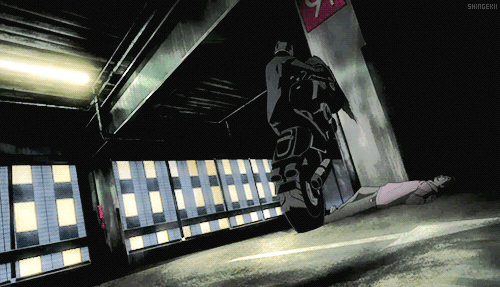
A man who’s body has no physical limits, allowing him to pick up and
throw things like vending machines and light posts.
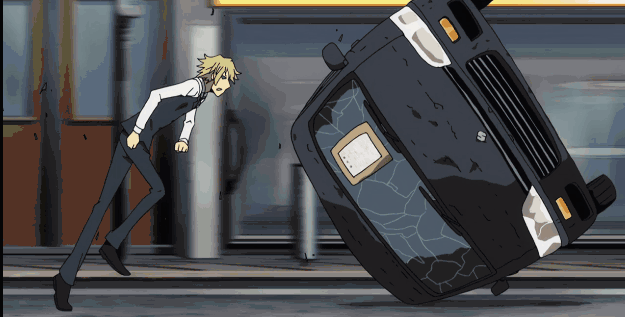
A sword that loves humans
and can control everything it cuts.

And that’s just the beginning of the
strange residence of the city of Ikebukoro. Most stories would try to
contextualize all of these strange beings and explain why they exist in this
story. And while the characters themselves are given a fair ammount of
backstory, the show never really tries to explain the fantastical elements.
They’re just there. Because it said so.
And you know what, there’s something kind of wonderful about
that sort of storytelling. While other books sit you down for a history lesson,
Durarara grabs you by the hand and asks you to roll with the punches. The
explanation doesn’t matter, it’s the story and how the characters bounce off
each other that the audience cares about. Don’t get caught up in the details.
Enjoy yourself and have fun!
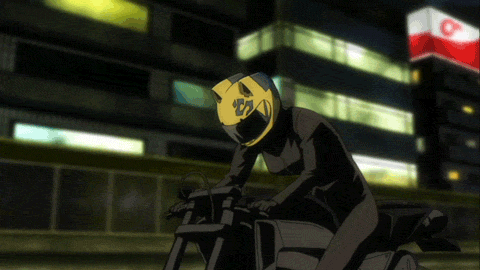
Now I’m not saying that Durarara has no world building. It
explores all of its fantasy elements from a psychological perspective. And all
of its elements and characters, once introduced, remain consistent throughout
the run of the show. Once or twice it forgets to adequately explain something
or a strange character falls by the wayside, but for a sixty episodes show
sporting a cast of thousands, it does a good job with what it has.
And I think we, as fantasy writers, can learn a lot from
Durarara. So next time you’re about to info dump, remember to trust your
audience to follow you. Be sparing with your information, grab them by the hand
and yank them right in. They’ll be able to keep up. They’re smart. And the
world ultimately isn’t the most important. It’s the story within it that
matters.
Wednesday, October 12, 2016
Notes from New York- Forced Conflict
Last week we talked about spotlighting trivial conflicts over big, life changing dilemmas and how that can drag down. But today I want to talk about forced conflicts. These are plot threads that an author often adds just to spice up the tension but, ultimately, they just aren’t needed.
I spoke last time of a manuscript that gave focused to a character conflict over far more pertinent financial struggles and natural disaster fall out. Well this same MS also had its fair share of forced conflict. The characters always seemed to be clashing for really unnecessary reasons. All of the dilemmas were easily solvable by communication but instead the author dragged them out for as long as possible. It made the reading experience frustrating rather than engaging, and that it is a fine line you really don’t want to cross.
The Lord of the Rings movies, on a larger scale, also had some forced conflict that didn’t necessarily need to be there. There are enough stakes with the orcs and Mordor and a quickly developing, worldwide conflict. But changes like making Faramir an asshole honestly detracted from the movie rather than adding to it. Peter Jackson added this conflict because he didn’t want to lose the stakes but there were plenty of stakes to begin with. Also it didn't happen in the book.
So, how do you tell if your side conflicts are forced? Well here are a few hints.
1) They can be easily solved
If you have to use contrivances like misunderstanding and miscommunication to keep a conflict going, it’s going to feel forced. Misunderstanding can be an excellent story telling device in comedy but in dramas it is tiring, especially when the misunderstanding continues on for several pages without resolution.

2) They are contrived
Good conflicts are built up over time. Bad conflicts are caused by contrivances like a character walking into the room at just the wrong time to hear just the wrong words, often out of context. Stuff like Shrek walking up to the house in time to hear Fiona’s words out of context and making him think she’s calling him an ugly ogre. It’s the kind of stuff that makes you want to mutter ‘are you kidding me’. Your third act tension should be caused by something legitimate, not just some easily avoided misunderstanding

3) They are predictable
A long time ago I did a post on the ‘liar revealed’ trope, especially focusing on A Bug's Life. This plot usually begins with the telling of the lie and in your heart, the entire time, you know the lie must be discovered and then forgiven. Any tension created off of this plot is so predictable because we know the reveal will come and we know that ultimately the hero will be forgiven and it won’t matter in the end. So dragging out the lowest point as a ‘will they be forgiven’ plot point is so boring because we can see the resolution coming a mile away. I loved the most recent Star Wars movie because when Fin reveals he lied about being part of the resistance, Rey barely cares. There are more important things to worry about. It was beautiful.

4) They are unnecessary
Sometimes, your book has plenty of tension. Really. If the world is ending or the town is flooding or someone is dying that is plenty of tension. Sometimes a forced conflict is just an unneeded crutch that holds the actually interesting plot back. And as we discussed last week, you want to focus on the right things. It’s not that you don’t need small conflicts and arguments along the way, but they shouldn’t outstay their welcome.

Sometimes, small conflicts happen, in fiction and real life. And subplots, of course, are the spice of a novel. But if you find a side conflict dragging on too long, relying on contrivances or taking the focus from more important conflicts, it may be time to tone it down a bit. Your readers will thank you for it.
I spoke last time of a manuscript that gave focused to a character conflict over far more pertinent financial struggles and natural disaster fall out. Well this same MS also had its fair share of forced conflict. The characters always seemed to be clashing for really unnecessary reasons. All of the dilemmas were easily solvable by communication but instead the author dragged them out for as long as possible. It made the reading experience frustrating rather than engaging, and that it is a fine line you really don’t want to cross.
The Lord of the Rings movies, on a larger scale, also had some forced conflict that didn’t necessarily need to be there. There are enough stakes with the orcs and Mordor and a quickly developing, worldwide conflict. But changes like making Faramir an asshole honestly detracted from the movie rather than adding to it. Peter Jackson added this conflict because he didn’t want to lose the stakes but there were plenty of stakes to begin with. Also it didn't happen in the book.
So, how do you tell if your side conflicts are forced? Well here are a few hints.
1) They can be easily solved
If you have to use contrivances like misunderstanding and miscommunication to keep a conflict going, it’s going to feel forced. Misunderstanding can be an excellent story telling device in comedy but in dramas it is tiring, especially when the misunderstanding continues on for several pages without resolution.

2) They are contrived
Good conflicts are built up over time. Bad conflicts are caused by contrivances like a character walking into the room at just the wrong time to hear just the wrong words, often out of context. Stuff like Shrek walking up to the house in time to hear Fiona’s words out of context and making him think she’s calling him an ugly ogre. It’s the kind of stuff that makes you want to mutter ‘are you kidding me’. Your third act tension should be caused by something legitimate, not just some easily avoided misunderstanding

3) They are predictable
A long time ago I did a post on the ‘liar revealed’ trope, especially focusing on A Bug's Life. This plot usually begins with the telling of the lie and in your heart, the entire time, you know the lie must be discovered and then forgiven. Any tension created off of this plot is so predictable because we know the reveal will come and we know that ultimately the hero will be forgiven and it won’t matter in the end. So dragging out the lowest point as a ‘will they be forgiven’ plot point is so boring because we can see the resolution coming a mile away. I loved the most recent Star Wars movie because when Fin reveals he lied about being part of the resistance, Rey barely cares. There are more important things to worry about. It was beautiful.

Sometimes, your book has plenty of tension. Really. If the world is ending or the town is flooding or someone is dying that is plenty of tension. Sometimes a forced conflict is just an unneeded crutch that holds the actually interesting plot back. And as we discussed last week, you want to focus on the right things. It’s not that you don’t need small conflicts and arguments along the way, but they shouldn’t outstay their welcome.

Sometimes, small conflicts happen, in fiction and real life. And subplots, of course, are the spice of a novel. But if you find a side conflict dragging on too long, relying on contrivances or taking the focus from more important conflicts, it may be time to tone it down a bit. Your readers will thank you for it.
Friday, October 7, 2016
Lessons from Anime: Why so Serious? (Baccano and Durarara)
Alright, we’re back with a new stretch of Lessons from
Anime. I know some of you (many of you) aren’t anime watchers. I understand.
Jumping into anime is as vague as jumping into movies. Because Anime is only a
medium of Japanese animation and can cover every genre under the sun. Also, it
has a tendency to explore some weird stuff. I usually don’t recommend people
jumping into Anime without a world weary guide of sorts to give them
recommendations.
However, once you’re into the anime craze, it’s hard to
stop, and I’ve found that my writing has always been influenced by anime over
everything else. Many of my favorite stories from any medium come from anime.
So as we pick up this series again, we’ll be looking at why exactly I take so
many different writing lessons from these shows and how you can too, even without watching them (Though I highly recommend many of the shows discussed on this series). With that said:
Let’s jump in.
Ever heard the phrase ‘why so serious’? Of course you have.
It’s hard to escape the Dark Knight or the legions of joker cosplayers that
smear makeup on their face and call it a day. I love the Dark Knight, of
course. Its one of the only Christopher Nolan films I remotely enjoy. That’s
because Christopher Nolan films take themselves extraordinarily seriously to
the point of being boring and melodramatic. The joker, the chaotic evil villain of the
evening, is the only one to lend even a hint of humor, however dark. He brings
up a good point in ‘why so serious’. Namely, why is it that violent, action
movies have to take themselves so gosh darn seriously?
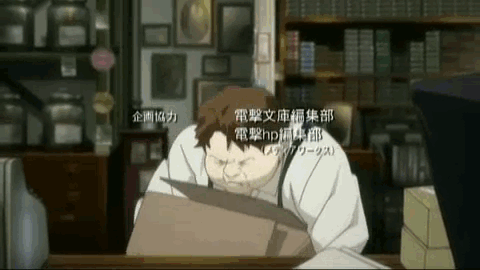
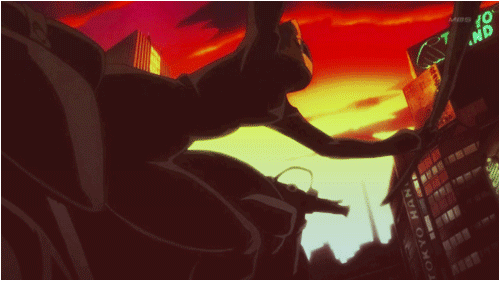
Baccano and its spiritual successor, Durarara, are two shows
filled with dark concepts on paper. Baccano has mobster shootouts, torture,
sadists and a whole lot of defingerings. Durarara has gangs, headless
riders, suicidal thoughts and serial killers. It would be easy to make either
series into a super serious battle to death sort of story.
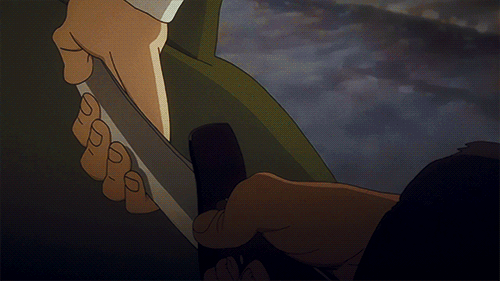 |
| Don't worry, he'll be fine |
But that wouldn’t be in keeping with the ‘why so serious’
spirit, would it?
Both Baccano and Durarara are just so much fun. And not even in a dark sense of
humor sort of way. Baccano has such an entertaining, light hearted tone that it would
almost fit in with the other Saturday Morning Cartoons. You know, if not for the blood.
Yeah, it could take itself more seriously, but when half of your characters are
immortal and the other half are kind of nuts, why worry about stakes? Its about
how these people bounce off each other. Thieves like Issac and Miria steal by
their own strange moral code and spread happiness to everyone around them.
Jacuzzi Splot cries, but then goes in and kicks ass with his pyromaniac
girlfriend. Ladd Russo kills a lot of people but he’s just so filled with puppy
like excitement, it’s hard not to love him.

This show isn’t about the black and whites of morals but
rather all of those little greys in between. None of the characters fall on the
lawful good section of the alignment spectrum--or the lawful spectrum at
all--but that all makes them so much more fun.

Durarara has more of a point than Baccano (which exists for
the purpose of being shallow fun), and has its share of serious topics. It
explores the desire for power, the effect of social media on the modern world,
and of course, suicidal thoughts. But it all operates under a more optimistic view of ‘life
happens and you get through it’. The world isn't really so awful as it seems.
Characters you would think are irredeemable
love and live and laugh. They all have comedic moments. They have dramatic
moments too. But in your heart, you know that the show is going to take an
optimistic spin. It’s not the sort of show to kill off its cast of thousands.

And on top of that it has some of the most ridiculous stuff.
Durarara is not bound by the mechanics of reality and watching a man throw a
fridge at another man has never been so funny. It has twisted love stories,
many of which will even have you asking ‘why’? But you get the feeling Durarara
is never making any moral judgments. It’s just showing a bunch of screwed up
people living their lives.

But why does it matter? Why are shows like these ultimately
more effective than the ‘everything is dark’ Christopher Nolan approach?
Because humor, however dark or ridiculous, is often the real coping mechanism
we need. And optimism, honestly, is so much more valuable than cynicism.
Baccano asks ‘why so serious’ and Durarara insists ‘the world isn’t as bad as
you think’ and honestly, I get so much more hope and enjoyment from both of
them.
Never take your stories or characters too seriously. Give
them room to enjoy themselves and breathe. Sometimes issues are best explored
through a little humor. Sometimes a good laugh over the craziness of life is
worth more than tears.
Wednesday, October 5, 2016
Focusing your Conflict
Welcome back to Notes from New York. Today, we’re talking
about focus. When you write a novel, some elements take the spotlight over
others. This is necessary. You can’t give equal attention to every element of
your novel. Some things are meant to take center stage while others skirt
around in the background.
One of the biggest mistakes you can make in your story is
focusing too much on the wrong thing. Every story as multiple conflicts and
sometimes, the story devotes far too much attention to the wrong conflict. For
instance, perhaps there is a post-apocalyptic event or war. Because of the
magnitude of this crisis, one would expect it to take the spotlight. But
sometimes, funny enough, a book pours its focus into a comparatively smaller
plot, like a romance. I mean sure, I get it, romance is important to a lot of
novels but if you’re focusing on conflict between your main couple while bombs
are going off in the background...there might be a problem.

Hunger Games played off this trope by emphasizing the irony
in constructing a romance angle in a fight to the death. Other novels, like
Harry Potter, Mistborn etc. keep the romance as a subplot, giving the focus to
the more interesting things. You know: dark wizards and saving the world.
Now obviously, I’m giving a drastic example, but this can
happen in contemporary fiction as well. I read a manuscript once where an
arbitrary conflict between characters took a lot more focus from far more
severe financial struggles and a natural disaster. Reading the MS had me
wondering aloud ‘does this really matter right now?’ You don’t want your reader
doing that.
So when you’re looking at your conflicts in your book, think
to yourself: What are my conflicts? Make a list of all of them, from the bigger
plot stuff to the character level dilemmas. Then reorganize that list, putting
the biggest conflict at the top and the smaller at the bottom. This should help
to illustrate which plot threads should be getting the majority of your focus.
Never give your reader the chance to wonder ‘why does this
matter’? Focus on the right conflicts and your MS will thank you for it.
Friday, September 30, 2016
Queries, Rejections and the Overflowing Inbox
Back with a new episode! Okay, USUALLY, this series will only update every Wedensday as I plan to start up Lessons from Anime again. However, this time, since I only gave you an intro on Wedensday, I'mma give you actual content. Away we go!
Okay so…agents get a lot of queries every day. A lot. And if
you consider the fact that reading queries is basically something they do in
their free time, they don’t have a lot of time to comb through the slush every
day. In the case of one of my internships, it was my job as the intern to comb
through the slush and look for queries that fit the agents taste.
When I came to the office there were about six hundred
queries in the inbox with more coming in every day. That's A LOT.
You just don’t have time to carefully read all of those queries so you have to find ways to get through them quickly.
You just don’t have time to carefully read all of those queries so you have to find ways to get through them quickly.
Its easy to throw away stuff that doesn’t follow the query
guidelines, but here are some other reasons that I tossed a query into the no
folder soon after I started reading.
1.
Lots of errors
Really, if you want your work to look good, edit it ten or
twenty times before pressing the send button. A lot of errors quickly tells an
agent that you have some basic developing to do and that you’re not great at
self-editing. Put your best foot forward.
2.
Cliché premise
Some stories, we’ve heard before, and there are plenty of
queries that sound as dull as they come. Nothing original sticks out about. It
sounds like a conglomeration of other plot lines that have been done before.
Now, of course there aren’t many original ideas out there, but most works do
have a stand out element. Find what stands out about your work and feature that
in your query
3.
Played out genre
The agent basically told me to put anything dystopian and
paranormal romance in the ‘no’ folder unless it was REALLY good. When you’re
writing in a genre that’s been played out, it has to be something truly
special, so sometimes you’re fighting an uphill battle. That’s not to say that
some agents won’t still be on the lookout for your genre, but if an agent says
that they’re tired of something…they probably aren’t the right one for you.
4.
Similar to something already on their list
A lot of times it’s good to submit to an agent who reps
titles comparable to your work. But if they’re too comparable, then the agent isn’t going to take it on. Simply
put, they’re already working on something similar so unless yours blows their
socks off, they’ll let it go
5.
Just not right
More than once, I forwarded a submission that I thought was
original and really knocked my socks off. But sometimes that would still get
rejected because it wasn’t right. A picture book that was a little too long for
instance, or just something that didn’t peak the agents interest. It happens,
to be sure. And you want someone who is fully passionate about your book, so its for the best.
6.
No Voice
Sometimes a book lacks a certain feel. A certain life. This
life is usually imbued by voice and there are plenty of submissions that don’t
have that. Often they come from more inexperienced writers who haven’t found
their voice yet. Its one of those things that come with practice.
7.
Just…average
I read plenty of submissions that were well written with
nothing technically wrong with them but none of them grabbed me. An agent wants
to be pulled off of their chair (figuratively. I don't recommend actually pulling an agent off their chair) and into the story. When
something is just ‘good’ then it goes in the no folder.
8.
I’ve seen something similar that day that was
better
Sometimes a submission raises my standards for the day. Then
I might stumble across a similar submission that isn’t as good. Because of the
first, brilliant submission, the other submission might pale in comparison.
As you can see, a lot of this stuff is situational. It
depends on the day and the other things the agent sees. Agents are biased
people. They have good and bad days. Their tastes and interests shift. That’s
what makes the trenches a difficult place to navigate.
The point is: sometimes rejection isn’t your fault. Don’t go
running off to change your query after a few rejections. But several rejections
may tell you that your query isn’t standing out.
No matter what, put your best foot forward and do whatever
you can to help your novel stand out. But always follow the query guidelines ;)
Wednesday, September 28, 2016
Notes from New York: Introduction
Hello friends! The Heroes and Heroism series is over, but now we have a whole new series to look at, this one more editing focused!
I meant to start this series earlier because, you know, it
would be fresher on the mind. But, while I had a very productive writing life
over the Summer…not so much with the blogging. Kind of fell off the wagon with
that one. But let’s jump back in shall we?

One of the reasons I fell off the wagon with blogging in the
first place was because during the spring semester of last year I was in New
York City! The Big Apple, City that Never Sleeps, etc. The program, through my
school, focused on viewing art, music, theater, dance and film all throughout
the city, as well as completing twenty hours of internships a week in order to
gain work experience in our chosen fields.

So, of course, I decided to pick up two internships at
Literary Agencies: Defiore and Co, and McIntosh and Otis. As a writer, the
publishing process is often an ‘other side’ that we never entirely understand.
That’s why we have our lovely agents to guide us along and help us through the
trickier parts. It was bizarre to really be
on the other side of the trenches where I queried for so long, and it definitely
gave me some insight into the process.
While I interned at these two places I:
Read the slush pile
Read partial and full requests and wrote readers reports
Also read client manuscripts and offered feedback
Compared contracts
And did some fun office work like mailing, copying and
filing (fortunately that was a small part of my internships)
I also got to observe real literary agents as well as their
assistance in their natural habitat, which involves a lot of emails and editing
and calls and over all hard work.
And I think that’s the most important thing: Literary Agents
work really hard. They are constantly juggling projects and clients in addition
to reading the slushpile. But there are only so many hours in the day, so they
only have the time for stuff that wows them.
So how do you wow them? How do you really stick out in that slushpile. And what kind of pitfalls
should you avoid. I hope that I’ve gained a little insight into that and in
this series, I hope to cover some editing tips for you as you’re fighting
through the trenches.
Until next time, happy writing!
Friday, September 23, 2016
Hero Spotlight: Chihiro and Coraline
Today lets look at two of my favorite child characters.
Both of these girls abscond to other worlds for fantastical
adventures. But both of their adventures have a dark twist to them and they
must fight to conquer their fears in order to get out alive (a pretty apt metaphor for entering adulthood, when you think about it).
In Spirited Away, a young girl named Chihiro finds herself
in the spirit world with her parents turned into pigs. In order to avoid
becoming food for the spirits herself, she must get a job at the bath house,
working for the witch Yubaba. Before being placed in this situation, Chihiro is
a normal ten year old, pretty selfish and lazy but also wholly relatable. And
over the course of the movie we get to see her growing stronger and putting her
wits to overcome many different challenges.
Chihiro must work for the first time in her life, solve
tough issues and even travel on her own through the spirit world to help a
friend in need. We see her grow from a kid who doesn’t know how to fend for
herself to a confident young woman, who can take responsibility and fight for
her loved ones. Of course she must go back to the real world, but she takes everything she has learned with her. I adore this movie so much. Its one of my
favorites and Chihiro is one of the best examples of a child character out
there.
On another end, we have Coraline, whose story is less
obviously about growing up and a few shades darker than the previous story.
Most people know this tale. Its about a dissatisfied child named Coraline
crawling through a door into another house where all of her dreams come true.
However her Other Mother might not be so benevolent as she seems.
 |
| In fact she is pretty terrifying |
Coraline is a very realistic child, smart and adventurous,
but also selfish and attention seeking. She likes the focus of life to be on
her and in her dream world, she gets just that. However, she must fight to keep
her soul from the Other Mother’s clutches (You know. For kids!) as well as save
the souls of other children who have been trapped before. Growing up, for Coraline, is
accepting that life can’t be exactly as she wants it and taking responsibility
for her mistakes. In the end, she must save her parents and others from the
Other Mother and ignore the temptation of a so called ‘perfect life’. Life isn't perfect, and everyone must accept that some point. In many
ways, Coraline learns the shades of grey of adulthood in this, also learning to
treasure her real parents, ordinary life, and the change of moving to a new town,
even if there are still challenges.
Children vs. growing up can be as vague and symbolic as
Coraline or specific as Peter Pan. But they all capture the need of a child to
eventually step into their own shoes and take control of their life for the first time. I love both
of these stories for that reason.
Subscribe to:
Posts (Atom)



